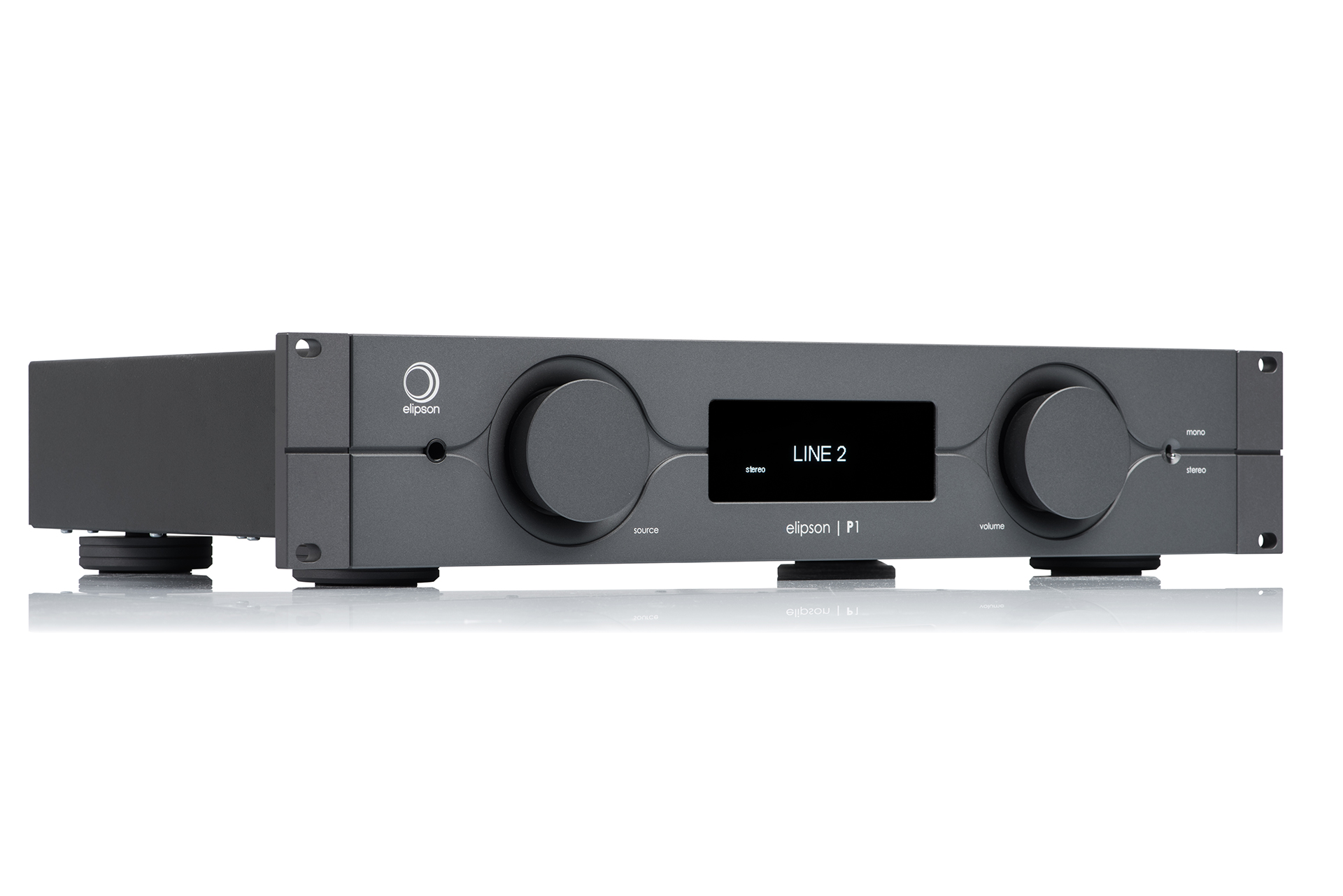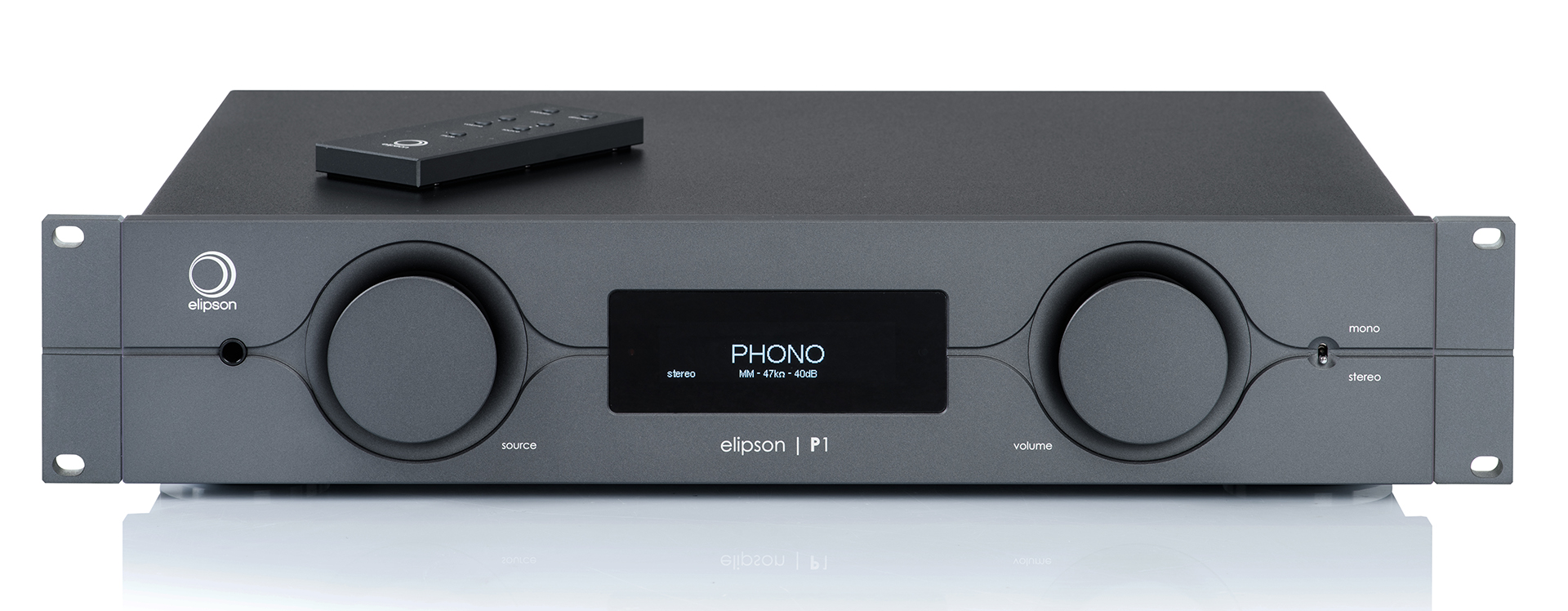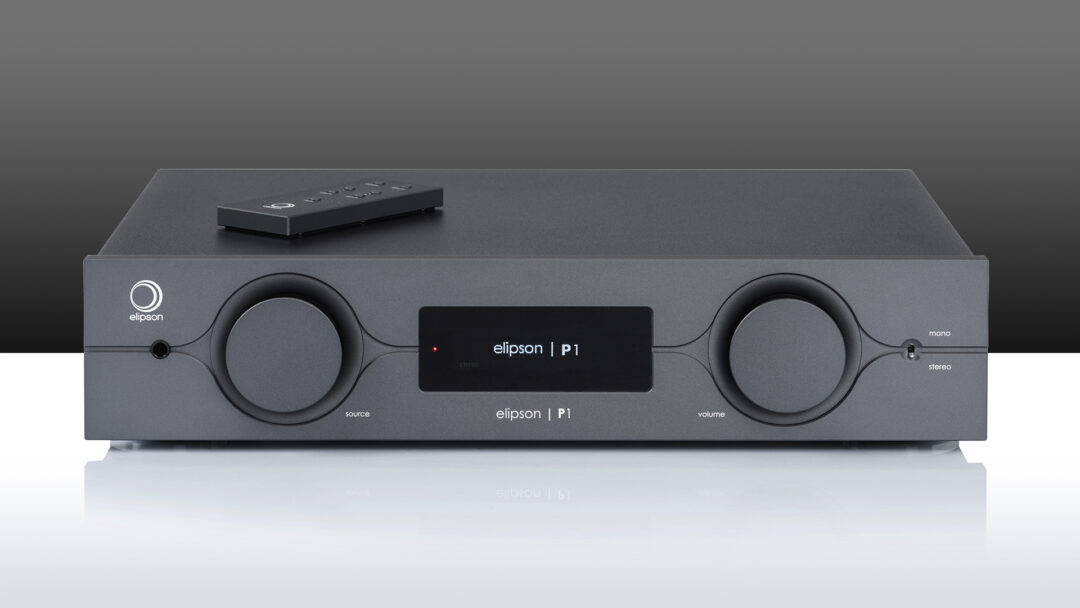New hi-fi manufacturers at the serious end are not often seen. And Elipson is far from new. But since 1940, the illustrious French company has been known solely for its loudspeakers. Often with sci-fi-like round shapes.
But now Elipson has broken out as an amplifier manufacturer with the P1 preamplifier, which we test here. There’s also a matching power amp, called the A2700.
Paradoxically, the Elipson P1 manages to be striking and subdued at the same time: The cabinet is square and grey. And in the same standard dimensions as most consumer hi-fi. The only thing that breaks the conformity is the centimetre-thick front panel, where two large knobs are framed by milled, softly curved lines. It’s a bit like trying to show your individuality by buttonholing a flower in a just slightly lighter shade of grey than your suit.
Fortunately, we’re not a design magazine, but rather a technology media that’s primarily concerned with the technology inside.
DAC and turntable input as plug-in card
In its simplest form, the Elipson P1 consists of a purely analogue preamplifier for line signals. If you want turntable input and/or a digital converter, these can be purchased in the form of two plug-in cards, each of which adds a few hundred euros to the cost of the preamplifier. The turntable module supports both MM and MC pickups, and the DAC module has optical, coaxial and USB inputs. The price quoted above includes both expansion cards.

What can’t be bought, however, is wireless connectivity and music streaming. If you want to share in the joys of the internet, or just stream Bluetooth for that matter, you’ll need external equipment, such as a Bluesound Node.
The Elipson P1 is an obvious partner for the Elipson A2700 power amplifier, but both can of course be used with other power amplifiers. The P1 could also be an obvious partner for a set of good active wired speakers such as the Genelec 6040R or Dutch & Dutch 8c.

Sound quality
As the Elipson P1 is created as a companion for the Elipson A2700, the latter was used as the power amplifier during testing. Although the P1 was also allowed to play through the NAD C 298 along the way. For comparison, an NAD C 658 preamp was used, which costs the same as an Elipson P1 without expansion modules with turntable input and DAC fitted.
Like the power amp, the Elipson preamp has its own sonic signature. But it’s far less pronounced. It took a lot of listening and many cable swaps before the characteristics were identified.
At first glance, the Elipson P1 has a rather open and forward playing style that matches the dynamic sound of the A2700 well. While the NAD C 658 opens a window into the concert hall, the P1 gives you the feeling of sitting close to the musicians who have set up inside the room.
The amplifier still conjures up an acoustic stage on which to place the instruments. But the sense of a deep stage with clearly defined walls is not as pronounced as on the NAD. That’s neither a good nor a bad thing – just different. And as the listening progresses, the nuances emerge. If the space (or rather the illusion of it) is not as deep on the Elipson P1, the clarity and experience of air between the performers is on the other hand much better.

A bit picky
Like the A2700 power amplifier, the Elipson P1 is somewhat fussy about the program material. Not in the sense that a less than perfect recording sounds bad. But you don’t really get to demonstrate why you should pay so much money for just a preamp. On the other hand, it’s important to remember that music can be used for more than testing. And that the equipment is just the path to the goal – but not the goal itself.
On this point, the Elipson P1 scores extra points. Instruments and voices sound a little warmer and more engaging than on the somewhat clinical NAD C 658.
Conclusion
The Elipson P1 is the French company’s first preamplifier. And it’s a convincing debut as an electronics manufacturer. Together with the A2700 power amplifier, you get an amplifier set that can hold its own in the price range.
The Elipson P1 has an open and engaging playing style, and it manages to bring out the fine details in the best recordings. On the other hand, it also costs quite a lot, but if you don’t need both DAC and turntable inputs, you can save some money by opting out of one or both of the plug-in modules.

We think
Warm and pleasant, but also very nuanced sound. The design is so discreet that it blends into any system. Turntable input and DAC cost extra on top of the already substantial price. No networking or streaming capabilities. At that price, the design is frankly a bit plain.
2990 €
Specifications
- Type: Preamplifier
- Analog inputs: 2 x line-in (stereo RCA), balanced in (stereo XLR)
- Turntable input (plug-in card): MM/MC (stereo RCA)
- Digital inputs (insert card): coaxial, optical (TOSLINK), USB-A
- Outputs: pre-out (stereo RCA), pre-out, balanced (stereo XLR), subwoofer (2 x RCA), headphones
- Wireless: No
- Streaming: No
- Room correction: No
- Remote control: Physical remote control
- Dimensions and weight: 43.5 x 10 x 40.5 cm / 7.4 kg
- Web: elipson.com

